Potřebujeme váš souhlas k využití jednotlivých dat, aby se vám mimo jiné mohly ukazovat informace týkající se vašich zájmů. Souhlas udělíte kliknutím na tlačítko „OK“.
ASTM D6042-09
Standard Test Method for Determination of Phenolic Antioxidants and Erucamide Slip Additives in Polypropylene Homopolymer Formulations Using Liquid Chromatography (LC)
Automaticky přeložený název:
Standardní zkušební metoda pro stanovení fenolických antioxidantů a erukamidu skluzu Přísady do polypropylénem formulací Použití kapalinová chromatografie (LC)
NORMA vydána dne 1.9.2009
Informace o normě:
Označení normy: ASTM D6042-09
Poznámka: NEPLATNÁ
Datum vydání normy: 1.9.2009
Kód zboží: NS-33533
Počet stran: 5
Přibližná hmotnost: 15 g (0.03 liber)
Země: Americká technická norma
Kategorie: Technické normy ASTM
Kategorie - podobné normy:
Anotace textu normy ASTM D6042-09 :
Keywords:
additive, antioxidants, erucamide slip, extraction, Irgafos 168, Irganox 1010, Irganox 1076, Irganox 3114, liquid chromatography (LC), polypropylene (PP), vitamin E, Additives--plastics, Erucamide (slip), Liquid chromatography (LC), Phenolic antioxidants, Polypropylene (PP), Ultraviolet (UV) analysis--plastics, ICS Number Code 71.040.50 (Physicochemical methods of analysis), 83.080.20 (Thermoplastic materials)
Doplňující informace
| Significance and Use | ||||||||||
|
Separation and identification of stabilizers used in the manufacture of polypropylene is necessary in order to correlate performance properties with polymer composition. This test method provides a means to determine erucamide slip, Vitamin E, Irgafos 168, Irganox 3114, Irganox 1010, and Irganox 1076 levels in polypropylene samples. This test method is also applicable for the determination of other antioxidants, such as Ultranox 626, Ethanox 330, Santanox R, and BHT, but the applicability of this test method has not been investigated for these antioxidants. The additive-extraction procedure is made effective by the insolubility of the polymer sample in solvents generally used for liquid chromatographic analysis. Under optimum conditions, the lowest level of detection for a phenolic antioxidant is approximately 2 ppm. Note 2—Other methods that have been used successfully to remove additives from the plastics matrix include thin film, microwave, ultrasonic, and supercritical fluid extractions. Other methods have been used successfully to separate additives including SFC and capillary GC. Irgafos 168 is a phosphite antioxidant. Phosphites are known to undergo both oxidation and hydrolysis reactions. Less Irgafos 168 will be determined in the polymer when oxidation occurs during processing. The HPLC separation is capable of separating the phosphite, phosphate (oxidation product), and hydrolysis product and quantify them if standards are obtained. No significant breakdown of the phosphite antioxidant has been seen due to either extraction technique or the separation presented in this standard. |
||||||||||
| 1. Scope | ||||||||||
|
1.1 This test method covers a liquid-chromatographic procedure for the separation of some additives currently used in polypropylene. These additives are extracted with a cyclohexane:methylene chloride mixture using either reflux or ultrasonic bath prior to liquid-chromatographic separation. The ultraviolet absorbance (200 nm) of the compound(s) is measured, and quantitation is performed using the internal standard method. 1.2 This standard does not purport to address all of the safety concerns, if any, associated with its use. It is the responsibility of the user of this standard to establish appropriate safety and health practices and determine the applicability of regulatory limitations prior to use. Specific precautionary statements are given in Section 9. Note 1—There is no known ISO equivalent to this test method. |
||||||||||
| 2. Referenced Documents | ||||||||||
|
Podobné normy:
Historická
1.1.2013
Historická
1.5.2014
Historická
1.11.2011
Historická
1.12.2012
Historická
1.10.2013
Historická
1.10.2013
Odebírejte informace o nově vydaných normách ZDARMA:
Chcete pravidelně odebírat informace o nově vycházejících normách z celého světa a to zcela zdarma?
Přihlašte se k odběru. Vše je velice jednoduché a absolutně ZDARMA.
Na výběr máte vydavatele z celého světa.


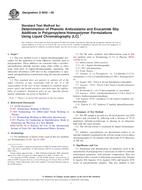
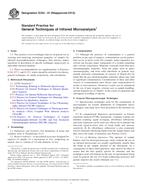 ASTM E334-01(2013)..
ASTM E334-01(2013)..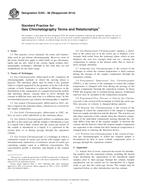 ASTM E355-96(2014)..
ASTM E355-96(2014)..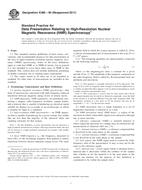 ASTM E386-90(2011)..
ASTM E386-90(2011)..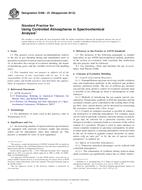 ASTM E406-81(2012)..
ASTM E406-81(2012)..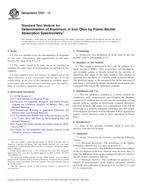 ASTM E507-13
ASTM E507-13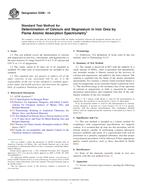 ASTM E508-13
ASTM E508-13
 Cookies
Cookies
